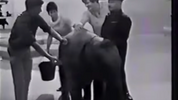I'm writing this blog following the first major release from the UK's version of Lockdown which saw many businesses such as hairdressers, tattoo parlours, and nail bars being able to open up.
It's also the same weekend that the NHS celebrates another milestone in its 72 year history - Awesome, and extremely proud of all of them.
Around the world each country has looked to introduce its own flavour of 'track & disgrace' (typo error deliberate btw) it seems to me that rather than looking to learn from other best practise there seems to be some kind of mental block that we are different than others and it couldn't possibly apply here!.
Saturday 4th Julyhospitality sector has been patiently waiting for.
has also been a date the
Which means that pubs, bars, and restaurants have been able to open up with many rules and related expense for implementing the social (physical) distancing rules passed onto the owners.
From what we saw from the first Saturday of pubs opening up is that despite the investment and best attempts by those in the hospitality sector that alcohol diminishes the logic to support said physical distancing - 'They Think It's All Over' comes to mind.
Without a doubt for all businesses to survive adapting to the 'new normal' will continue to be an ongoing challenge.
So, lets assume we have the opportunity to look at other countries and see if we can learn from their success and failure to help kick start our retail sector.
There are many countries where we could pick up tips and ideas that will help to move the dial forwards, and as I've written before one of the most agile and innovative is China - link below.
This is a snapshot of one of the key things several retailers have done to get things going.
Retrain for revamps:
While many traditional retailers are busy laying off or furloughing hundreds of salespeople, some are opting for skill upgrades.
Jeweler Ideal proactively transformed its sales associates into online influencers, or, as they are known in China, key opinion leaders (KOLs).
To help employees less experienced with social media marketing and live presenting, the company expanded its online corporate university to include special curricula on such topics.
Later on, jewelry expert and KOL broadcaster Ming Zhang was recruited to train Ideal’s employees to further upgrade their broadcasting skills. Regardless of their role and position, employees could have immediate access to online training, and hundreds have since become effective presenters.
Companies can and should take steps to retrain employees across different positions.
This is an alternative way, but it relies on brand going 'cold ad tech turkey' for a period of time along with investing expert training to upskill the workforce.
Take a moment to consider the following industry stats;
- Less than 2% of Employees regularly share or create employer related brand content.
- Over 33% of Employees are unclear on what to post and how it could benefit their employer.
- There is a 561% increase in audience for your brand message when shared by employees vs sharing via the corporate channel.
- 90% of your employee network is new to your brand meaning you are opening up previously untapped audiences.
So, how about investing in upskilling your employees to use social media as way of providing a genuine and authentic voice, rather than the corporate message, or an extension of your customer service department.
It relies on going back to basics with storytelling and creativity, it relies on those brand being prepared to 'listen' to it's audiences, it relies on those brands employees becoming more socially engaging.
The clock is ticking at faster rate than ever before - the 'time' for change has already happened.
Teams can decide, for instance, which marketing format to use — from live streaming, to friend-circle promotion, to group-buying tactics. The company also tracked the success and conversion rates of different formats and shared this information through the online sales network, empowering employees to use collective data and knowledge.
 unknownx500
unknownx500











